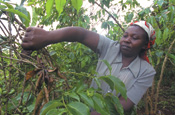
The issue of food miles was an early topic on the green agenda and has really taken off among consumers in the past three years.
Food miles describe the distance food travels from producer to consumer. According to international development agency Practical Action food for the UK travels 30 billion kilometres each year, adding 19 million tonnes of CO2 to the atmosphere.
Solitaire Townsend, founder and chief executive of sustainable development and communications company Futerra, claims the concept of food miles is far easier for individuals to grasp than carbon footprints. She said that if consumers see lamb is labelled from New Zealand or mange tout from Africa it is easy for them to avoid it.
Asda's policy is to source British produce wherever possible. It increased the amount it stocks from 6,200 to 6,800 last month as part of its Local Week promotion.
A recent survey by the supermarket found that shoppers prefer to purchase local produce wherever possible and it has now pledged to double the amount in its store by 2011.
The Wal-Mart-owned supermarket has set up a system of 13 hubs for its local producers to cut down the distance their produce travels to reach its shelves. It estimates that this has saved more over eight million road miles since it launched.
Townsend said it is generally the same group of 'ethical shoppers' that care about buying Fairtrade and buying local produce.
She said: ‘Ethical consumers want to support overseas economies but there's a conflict because they're also worried about the environment, which confuses and upsets them.'
An Asda spokesperson said: ‘The products we stock are dependent on a store-to-store basis of what sells in that area. We would delist one product to make room for another if there was more demand, but I don't think we'd ever have to chose local over Fairtrade.'
Sainsbury's was the first UK supermarket to offer Fairtrade food in 1994 and is currently its biggest Fairtrade retailer with 160 accredited products in store and more planned, (although it does still source over 90% of its produce from the UK).
King said: ‘I am concerned by suggestions that we should be focusing more on buying British, or at least European. This is increasingly done under the banner of environmental sustainability - so-called food miles.
‘A great deal of emphasis is being placed on climate change and other green issues and poverty reduction is being overshadowed by this.'
He believes that food miles alone are not the best way to judge whether products are sustainable.
A study commissioned by World Flowers, one of Sainbury's suppliers, examined the environmental impact of roses grown in the Netherlands and Kenya. It found that roses grown in Kenya and flown to the UK create only 17% of the carbon emissions of roses grown in the Netherlands. This is mainly due to the heating systems required in colder climates.
He said: ‘In the discussion about food security, people seem to be getting confused with protectionism. This is fundamentally flawed in my view.
‘Despite the economic downturn impacting the UK, people in Africa and other parts of the developing world are clearly still worse off than we are. We know that because of the size of our business we can make a real difference to people in developing countries.'
Townsend agrees that buying from producers is the right thing to do. But she asserts that the two issues are more closely linked than they might appear. The Intergovernmental Panel on Climate Change (IPCC) states that it will be large parts of Africa that suffer the most from drought and flooding caused by climate change.
She said: ‘The supermarkets need to show that it is an integrated issue, what I'm calling 'grethical'. I would like to know how they are going to bring clarity on these issues for consumers.'


.jpg)


.jpg)